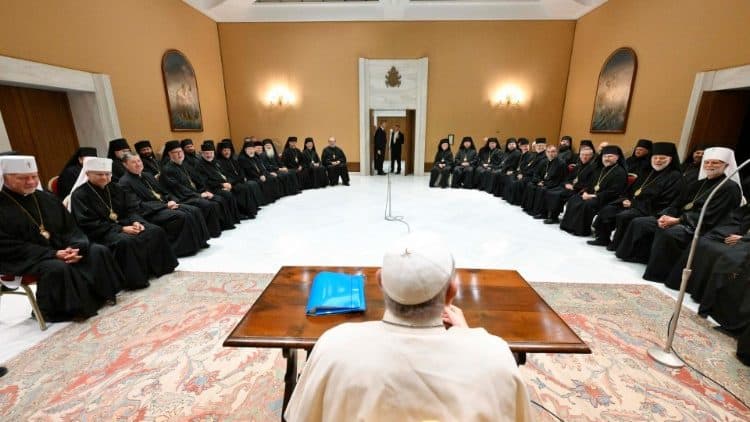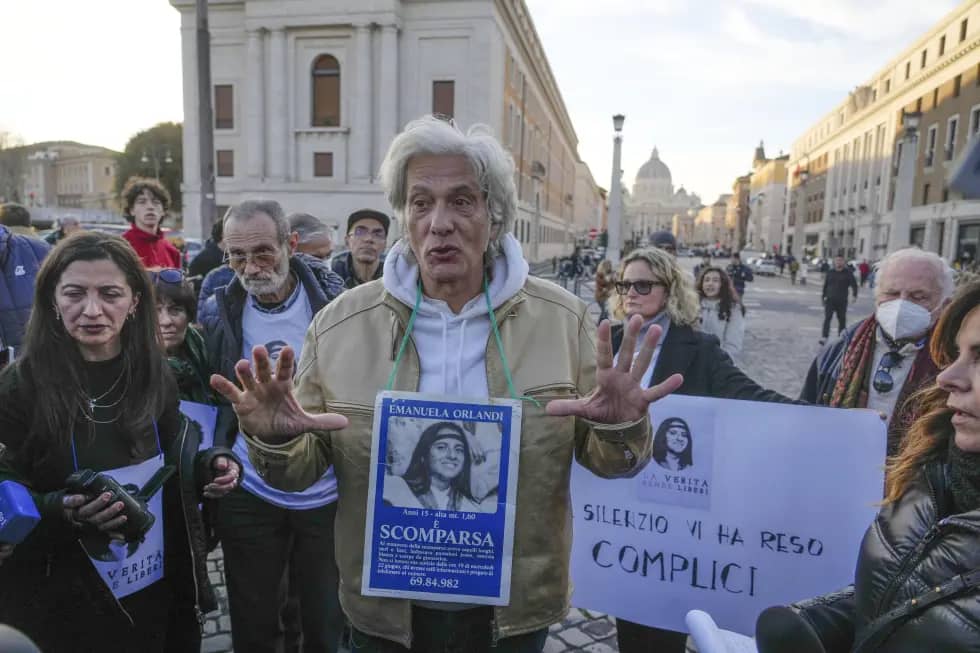ROME – Amid ongoing tensions related to Pope Francis’s controversial remarks in praise of “Great Mother Russia,” regarded by many Ukrainians as an exercise in Russian imperial propaganda, the Greek Catholic bishops of Ukraine want to train and designate representatives who can more clearly articulate their positions.
From Sept. 3-13, the Ukrainian Greek Catholic Bishops met in Rome for their annual synod with the theme, “Pastoral assistance to the victims of war.” The Ukrainian Greek Catholic Church (UGCC), numbering some six million faithful, is the largest of the eastern Churches in communion with Rome.
During the meeting, the bishops met with Pope Francis and several other top-level Vatican officials, discussing several action points going forward, including the formation of an ad hoc committee to oversee the provision of psychological support for victims of the war.
Communications emerged as a special focus during the bishops’ discussions, lent special urgency by the controversy over the pontiff’s comments in an Aug. 25 video conference with Russian Catholic youth gathered in St. Petersburg, in which he lauded “the Great Russia of Peter I, Catherine II, that great enlightened empire.”
The rhetoric generated immediate backlash by civil and ecclesial authorities, with national leaders accusing the pope of recycling Russian “imperialist propaganda” and the head of the Ukrainian Greek Catholic Church (UGCC), Major Archbishop Sviatoslav Shevchuk of Kyiv-Halyć, issuing a statement saying the pontiff’s words caused “great pain and concern.”
A senior advisor to Ukrainian President Volodymyr Zelensky, Mykhailo Podolyak, labeled Pope Francis as “pro-Russian” and “not credible,” going so far as to suggest that the Vatican’s line on the Ukraine war might be influenced by Russian investments in the Vatican Bank.
The Vatican Bank, known as the Institute for the Works of Religion, quickly denied the allegations, noting that it generally accepts deposits only from religious orders and other authorized Catholic entities around the world.
Since the beginning of the conflict, Francis has sought to walk a delicate line, speaking out over 200 times on behalf of Ukraine and praying for peace, while at the same time also attempting to appease Russian sensibilities.
At times the pope has found himself in hot water with the Ukrainian church, and the Ukrainian people, at one point calling the daughter of a Russian warmonger killed in car bomb an “innocent victim” of the conflict and once suggesting that Russia had legitimate security concerns as the NATO alliance had been “barking at Russia’s door.”
During what was described by the UGCC as a “frank conversation” between the bishops and the pope on Sept. 6, the issue of the pontiff’s remarks to Russian youth were discussed, as well as Francis’s many prayers offered for those experiencing “a dimension of martyrdom” amid the war.
As part of that discussion, the bishops decided to invest energy and resources into the creation of a formation program for people who can represent their Church to the outside world, essentially becoming the UGCC’s own in-house diplomats.
The proposal is to establish a special program within the UGCC dedicated to more effectively communicating their own perspectives and experiences, and forging a network to help them do so alongside the Vatican’s own diplomatic and communications efforts.
The bishops also expressed a desire to do more for Ukrainian refugees and those displaced by the war.
According to the United Nations, as of May there were 5.1 million people internally displaced in Ukraine and as of July more than 6.2 million had fled the country since the outbreak of their war with Russia, sparked after Russia’s invasion last February.
As time goes on with no clear end to the war in sight, and as refugees who fled to surrounding countries or other areas of Europe and beyond become more settled in their host communities, there is growing concern within the UGCC that these people will not come back to Ukraine, and that as a result, the Church will become fractured, with the bulk of faithful amid the diaspora.
In this sense, the UGCC, according to sources familiar with the discussion, wants to get their consecrated religious more involved in direct mission work with Ukrainian refugees, with the idea that if the people have moved, the Church must go with them and accompany them.
This will not be an easy task given how spread out the Greek Catholic diaspora is, with 200 parishes in four eparchies scattered throughout the United States alone, spanning from coast to coast. The UGCC is present in around 27 states, with the majority of faithful located in Philadelphia.
Globally speaking, the Church faces a growing challenge of covering vast physical spaces with limited personnel. Given that many faithful now reside in areas that might not have a UGCC parish nearby, the Church must determine how best to serve these people and communities.
In this regard, frequent missions are one potential solution the Church is interested in pursuing.
Another area of focus for the UGCC is marking the 30th anniversary next year of Ukraine’s nuclear disarmament with the signing of the Budapest Memorandum in 1994. Prior to that, Ukraine had more nuclear weapons stockpiled than China, France, and Great Britian combined.
With the periodic threat of nuclear retaliation by Russia that has arisen since the outbreak of the Ukraine war, the UGCC is anxious to highlight Ukraine’s ongoing commitment to nuclear nonproliferation.
Playing up the anniversary would also have the effect of showcasing a longstanding commitment to disarmament on the part of Ukraine, despite its repeated pleas for further military defense support, including the controversial use of cluster bombs.
There is also a desire within the UGCC to prioritize both short and long-term recovery from the war and preaching the Gospel in a drastically new situation.
With an estimated 150 people in Ukraine dying every day, coordinating international support is essential, as well as providing the pastoral closeness necessary for those who have experienced trauma that will undoubtedly scar generations to come.
Follow Elise Ann Allen on X: @eliseannallen













